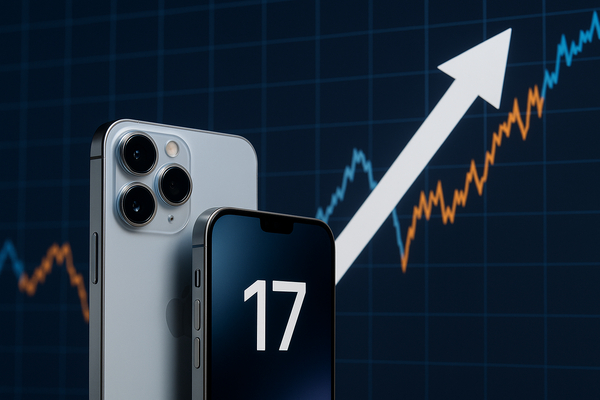
Apple surges on iPhone 17, nears $4 trillion market cap. Strong initial demand for the iPhone 17 and fresh AI features have pushed Apple (NASDAQ:AAPL) to record highs, driving short-term investor momentum while raising questions about long-term product-cycle durability. Analysts have raised price targets and sentiment has shifted to upgrade optimism. Globally, the move reshapes tech rankings — Microsoft (NASDAQ:MSFT) has been displaced as the No. 2 public company — while supply-chain changes such as expanded manufacturing in Vietnam with BYD (SEHK:1211) shift production footprints away from China. The story matters now because sales data, analyst upgrades, and a regulatory fight over device access are all converging this week.
Market reaction: stock gains, upgrades and record valuations
Shares of Apple (NASDAQ:AAPL) hit fresh highs after reports of brisk iPhone 17 sales and a string of positive analyst notes. One analysis cited the stock at $262.24, up roughly 6.8% over the prior month. Other coverage noted recent trading activity up about 4% in shorter windows as investor focus sharpened on product momentum.
Wall Street response has been immediate. Firms raised price targets and upgraded estimates, and commentators including Jim Cramer publicly recommended Apple this week. That buying pressure has pushed Apple toward a near-$4 trillion market capitalization, a level that briefly moved Apple ahead of Microsoft (NASDAQ:MSFT) as the world’s second-most valuable public company. Short-term this lifts sentiment across tech indexes. Longer-term, valuation now includes growing expectations for Apple’s role in AI-equipped devices and recurring services revenue.
Product cycle and supply-chain shifts: iPhone 17 sales and Vietnam expansion
Apple’s iPhone 17 is the immediate sales driver. Early demand appears stronger than last year’s cycle, and firms such as Wedbush expect a fiscal Q4 revenue beat tied to the product. Coverage points to AI enhancements in the phone that are stimulating upgrades and accessory purchases.
On the supply side, Apple is broadening its manufacturing footprint. A newly reported expansion with BYD (SEHK:1211) moves final assembly, testing and packaging of some devices — notably smart-home products and iPads — into Vietnam. That change reduces concentration risk tied to any single country and speeds regional diversification for component sourcing and logistics.
- Short-term: Strong iPhone 17 sales lift revenues and service attachment rates.
- Medium-term: Vietnam manufacturing adds capacity and resilience for non-phone product lines.
- Long-term: AI-enabled devices and a broader supply base support a more durable upgrade cycle and higher recurring revenue potential.
Regulation and reputation: EU watchdog attacks UK demand for iPhone ‘backdoor’
Regulatory friction has emerged as a parallel storyline. A European tech watchdog criticized the British Government’s demand for what it called “backdoor” access to consumer iPhone data, putting pressure on Home Secretary Shabana Mahmood and elevating privacy concerns. The clash highlights a trade-off: law-enforcement access versus end-user encryption and device security.
Why this matters now: governments across Europe and elsewhere are revisiting rules on encryption, data access and device interoperability. Any policy that weakens device-level security could alter consumer trust and product design choices. For Apple, which markets privacy as a core differentiator, the risk is reputational and regulatory. For markets, the dispute could shape how vendors design secure software and where they host sensitive services.
Key takeaways
- Apple’s iPhone 17 sales and AI features are the immediate bullish catalyst; analysts point to a potential fiscal Q4 revenue beat.
- Market-value milestone: Apple is closing in on a $4 trillion market cap and briefly overtook Microsoft as the second-largest public company by market value.
- Policy risk is elevated — UK demands for data access drew criticism from a European watchdog, creating potential headwinds for Apple’s privacy positioning.
Overall, the convergence of product momentum, manufacturing realignment and regulatory scrutiny makes this a consequential moment for Apple. Short-term gains are clear; the long-term path will depend on sustained product demand, execution in new manufacturing hubs, and how policy makers balance security with privacy.












